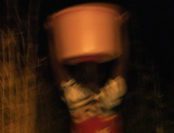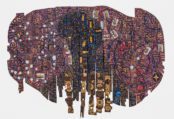Second week of term, and we start to acclimatise ourselves to having all of these damn students around.
Although the first intake (ie. the 17 that have already done one term) have been pissing me off mightily. For the two lectures and two classes so far the attendance has been 8, 8, 6 and 7. In other words there hasn’t yet been one occasion when even half the class managed to turn up.
This was particularly infuriating when, the other day, there was a lecture, a one hour gap, and then a class. Eight came to the lecture, then another five showed up in my office in the hour break because they knew I had essay feedback to give them. When I got to the class, only five people were there. Five rolled in about 15 minutes late, and I think were a bit surprised when I went mental at them.
The good thing, in a way, is that I’m getting much better at this instant and assertive distribution of justice. In other words, I’m willing to go to full bollocking from a standing start at any moment, and this, for now, promises to keep the new bunch in line, even if the old lot are taking some reminding. It’s making me feel a bit mentally unstable, however.
It’s been a strange experience being back here in some ways – and by “here”, I mean the university. I’ve spent a large part of the last fortnight feeling completely disillusioned with the students, the institution itself, the organisation, and the culture here (certainly as it pertains to education). Yet, at the same time, I’ve enjoyed teaching again and there have been brief moments of light.
I came out of a seminar feeling like some actual, bona fide education had occurred
This morning was a case in point, in fact, when I came out of a seminar feeling like some actual, bona fide education had occurred. Always a nice moment, and one to hold on to.
Because I guess the question is, how do you judge what you are doing? What standards do you use to justify your decisions and your behaviour, and indeed make an evaluation of whether you’re doing the right or wrong thing?
Now, that question is ridiculously huge and problematic if you approach it in terms of your whole life, and I long ago discovered that the only way I could meaningfully function was to categorically separate daily events and decisions from the course of the future. Not so as to embrace some sort of instant gratification, consequence-ignoring life of hedonism (although that sounds appealing), but more to ensure that you don’t end up thinking that making a mistake today, or even just that what happens today, will have some sort of definite and definable consequences for the next 10 years. Or more.
In his novel Divisadero, Michael Ondaatje puts it like this: “If one minor thing went wrong, he was fated to die solitary. He could already list a hundred areas of danger, for at seventeen we are perfectionists”. I used to feel like that, like there were “areas of danger” all around and that the smallest mistake could mean a lonely death, a wasted life, a dystopian future of boredom and self-loathing etc….
you’re failing them as a lecturer and that the whole enterprise is doomed to failure
I still do have a tendency to think in that direction although I’m much better at heading it off these days. And it’s easy for this sort of thinking to leak into a teaching situation – ie. that a bad seminar, or kids misbehaving, or cheating, or whatever means that you’re failing them as a lecturer and that the whole enterprise is doomed to failure. That you’re not going to make a meaningful difference, but that perhaps you would if you were better.
Clearly, that’s absurd, but it can be difficult when, for example, 34 essays are submitted and only 10 of them are actually markable, because the rest are just flagrant plagiarism. But, I think the important thing to realise here, in Nigeria, is quite what we’re asking these kids to do – the leaps we’re asking them to make.
Because these are kids. I’d call them that in the UK, but the majority of undergraduates over there are, if immature, at least trying to act like adults. We’re getting 17 year olds here, effectively straight from GCSEs a lot of them, who have come from a shocking school system that has never asked them to take responsibility for themselves or even think for themselves. And many of them come from very wealthy backgrounds, which in Nigeria means that they’ve never done anything for themselves and live stupidly pampered lives.
two, admittedly butch, mother hens
On the first day of term, as George and I arrived, one young lad arrived in a car with two uniformed guards (not official, just employed by his family), who jumped out of the car, opened the door for him, put his rucksack on his shoulder, did it up for him, and generally fussed around like two, admittedly butch, mother hens. And this is not unusual. A girl who works here once told me that the only housework she’d ever done in her whole life was to make her own bed.
So in order to move these kids forward you have to think in a very different way, and try and work out what the important, basic steps are. But that’s very difficult when you don’t know where they’re coming from, and you have no idea what they have been taught so far.
what should I fight, and what should I put up with?
I feel like I’ve got a much better insight into these things now, even after one term, and I feel like I’m in a better position to teach this lot than I was the ones who rolled in six months ago. You’d hope that was the case, really, but it is one of those processes where every new thing you learn reveals to you the true extent of things that you don’t know. And every step also raises the question – what should I fight, and what should I put up with? What is acceptable? Where’s the line in the sand that you should be protecting like John Goodman in The Big Lebowski? What are the rules, goddammit?!
None of these questions is answerable, and in fact, today, I’m feeling pretty optimistic about it all. My general problem is, I guess, related to a sort of perfectionism that I naturally adhere to, or perhaps more correctly, my constant negative self-assessment. My brain naturally aligns itself with what Rimmer calls the “French Dictatorship School of Marking”, ie. that instead of starting with a mark of 0 and getting points for every good thing you do, you start with a mark of 100 and every mistake you make takes marks off, with none ever being put back on for good behaviour.
To put it another way, my former self that could have extrapolated a solitary death from one bad choice would have said, “the mistakes of others are no excuse for your own”.
Which is true, but man, it’s a hard creed to live by.
I’m not suggesting I’m making a bad fist of it here, I don’t think I am. But how do you judge? How do you say for certain? I don’t know the answer to that one, so I’m sticking with the give it a good go and sod the rest.
Plus, beer. That always helps.




















